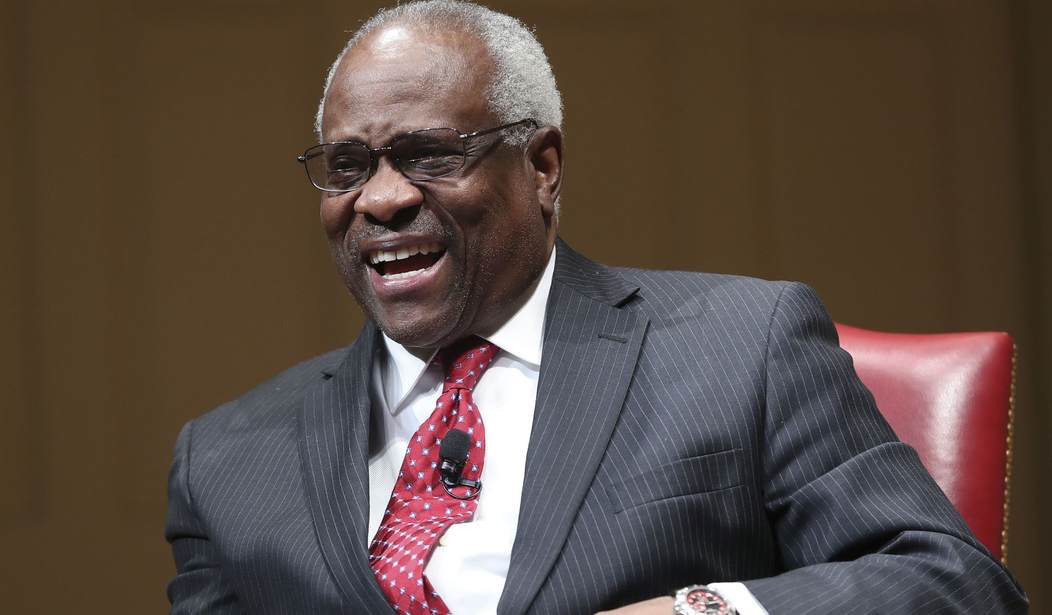The leftist meltdown since Elon Musk decided to let unwoke Americans opine on Twitter has been, at times, both hilarious and pathetic. But today, something surprising happened. One of the dumbest men in Hollywood and the worst Hulk ever, Mark Ruffalo, had a thought. The problem is, if it were ever implemented, it would make Ruffalo even unhappier than he is today. And it just so happens that Supreme Court Justice Clarence Thomas has had similar musings for completely different reasons.
Thursday, Ruffalo tweeted in response to news that Musk may roll back Twitter’s rules on “misinformation.” This dystopian word emerged during the pandemic and is often used interchangeably with “disinformation.” The latter is propaganda created by our enemies like Russia and China meant to mislead or divide Americans. The former is information that Democrats and their allies in the media don’t like. Hunter Biden’s laptop was “Russian disinformation” until it wasn’t. That COVID-19 vaccines did not prevent illness or disease transmission was “misinformation” until too many vaccinated people got sick.
Still, here is Ruffalo’s response:
As a worldwide “public square,” this app should be heavily regulated for misinformation & spamming by hostile interests. If Elon can’t do that with his “company,” it should be seen as a public utility under governmental supervision. This system unregulated will be more deadly. https://t.co/JO5QvcEfHa
— Mark Ruffalo (@MarkRuffalo) December 1, 2022
The public square is not particularly well regulated, especially in cities like Los Angeles or New York, where the homeless encampments and lax bail laws let the addicted and the mentally ill roam free. I guess Ruffalo has never seen the guy with the microphone and the sandwich board that says, “It’s the END OF THE WORLD!” or the Naked Cowboy in Times Square. It also seems he doesn’t understand that making Twitter a “public utility” would give more Americans access to it, and any rules would be applied universally. You could even be required to pay for it.
Let’s assume a user’s payment for Twitter is the copious personal data they collect. A public utility must provide service to everyone who makes that payment. And because all users must abide by the same rules, if name-calling were prohibited, then “TERF,” “misogynist,” “Nazi,” and a whole bunch of other slurs the Left loves to use against their ideological enemies would be banned. A public utility cannot discriminate, even if the Left wants it to.
In a recent case that reached the Supreme Court, several users sued former President Donald Trump for blocking them on Twitter. They asserted that his timeline and their ability to respond were constitutionally protected. In his concurrence with the dismissal of the case, Thomas observed that a Twitter account could not really be a government forum if a private company could eliminate it on a whim. Twitter had suspended Trump’s account at that point.
“Today’s digital platforms provide avenues for historically unprecedented amounts of speech, including speech by government actors. Also unprecedented, however, is the concentrated control of so much speech in the hands of a few private parties. We will soon have no choice but to address how our legal doctrines apply to highly concentrated, privately owned information infrastructure such as digital platforms.” Thomas wrote in his concurrence.
That could be why Thomas posited that social media companies might fit under the same rules that govern common carriers like phone services or places of public accommodation like movie theaters. The phone company cannot end your call if they do not like the opinion you are voicing, and a movie theater would be hard-pressed to bar you if you wore a MAGA hat to see the next Marvel Avengers film. This type of regulation could also prevent social media from throttling content from some media outlets while promoting others.
In any case, the government would struggle to regulate only Twitter. All social media platforms operate under the same code, Section 230 of the Communications Decency Act. Changing the rules for one of them would change the rules for all of them. And with a convergence of cases going through the courts right now, Ruffalo may get his wish, sort of.
In NetChoice, L.L.C. v. Paxton, the trade association representing TikTok, Meta, and Twitter argued that an anti-censorship law in Texas violated the social media platforms’ First Amendment rights to editorial discretion. The law specifically addresses viewpoint discrimination. The district court issued an injunction on those grounds. At the Fifth Circuit, Net Choice tried to argue that social media platforms are similar to other news publications and that content curation is First Amendment-protected speech in the form of editorial discretion.
The Fifth Circuit rejected that argument, pointing to the social media platforms’ practices and representations to their users. The Court also cited the language of Section 230 of the Communications Decency Act, which removes liability from the social media platforms and sites that host comment sections for content posted by users that may violate the law. This prevents those companies from exercising editorial control. The decision classified social media platforms as “common carriers,” which have always been subject to statutory nondiscrimination requirements, and upheld the Texas law.
Florida passed a law similar to the one in Texas. Net Choice sued Florida in the 11th Circuit Court. The two decisions conflict because the 11th Circuit ruled that the state could not declare the social media platforms “common carriers” and granted that the content moderation by the companies constituted editorial judgment protected under the First Amendment. Both the State of Florida and Net Choice petitioned for certiorari. SCOTUS is still deciding whether to hear the cases and settle the dispute. But if they do, Twitter and every other platform may be “regulated,” just like Ruffalo thinks they should be.
It is just unclear whether the viewpoint discrimination Ruffalo is seeking will be the result.










Join the conversation as a VIP Member